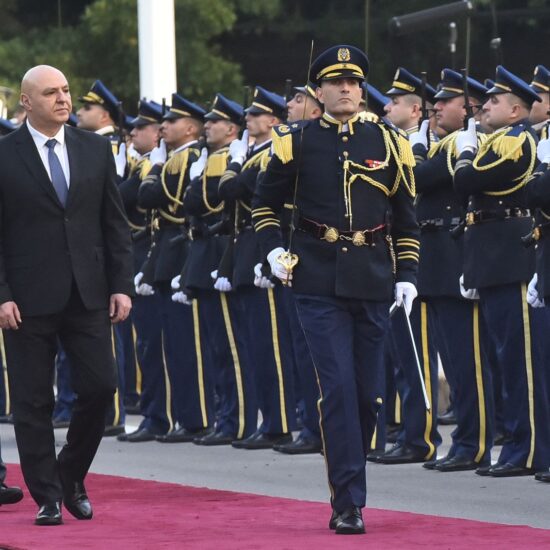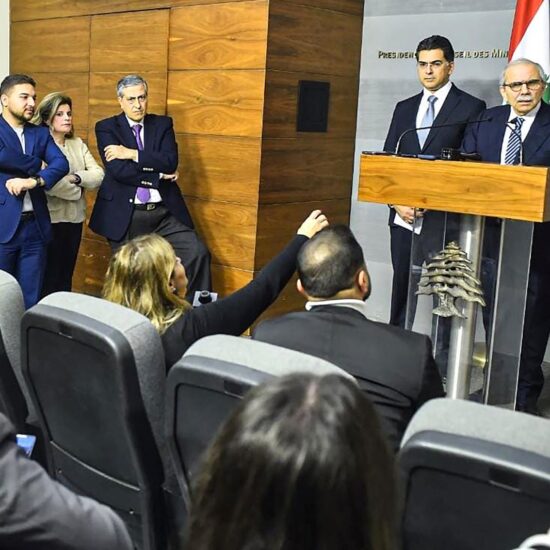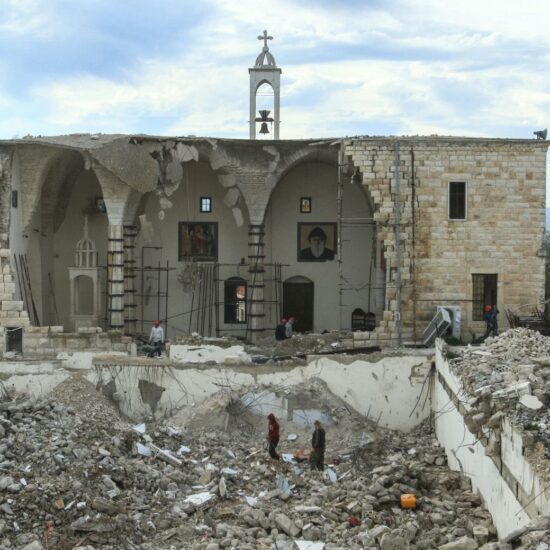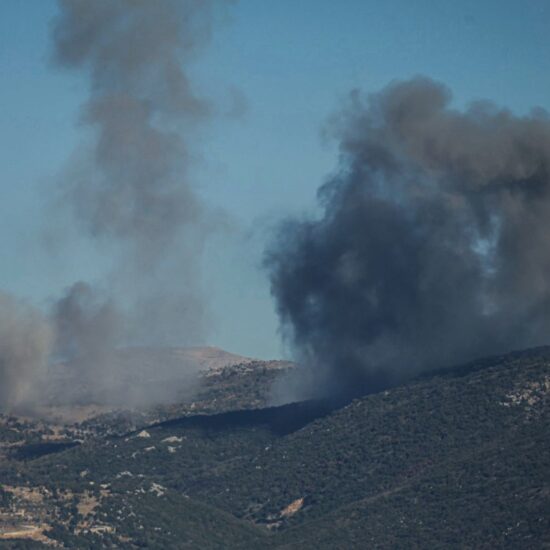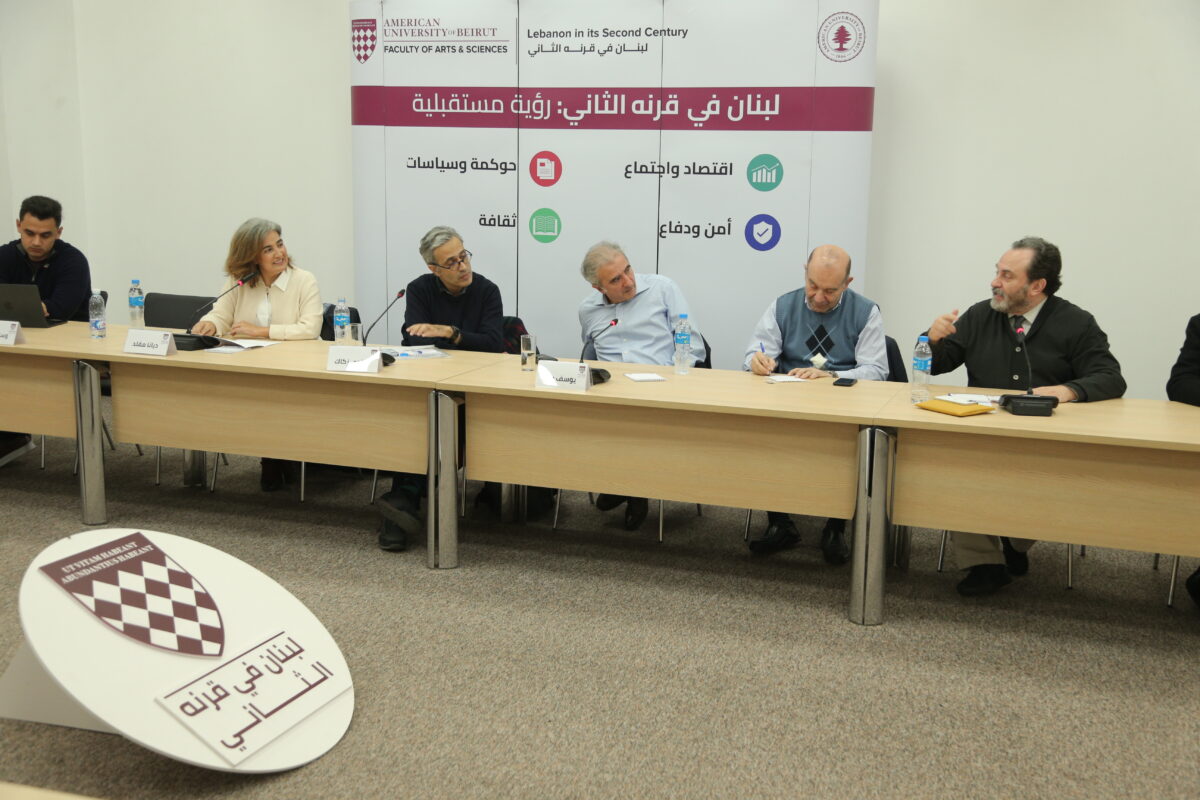
Round table 4 of Lebanon in its Second Century: A Forward Vision.
“Culture as a drive for Lebanon’s Identity” was the headline of the fourth session of the American University of Beirut’s seminars series: “Lebanon in its Second Century: A Forward Vision,” which kicked off on November 1.
The panel aimed to explore existential threats to Lebanon’s identity through understanding its model of culture. Also under scrutiny was the issue of Lebanon’s specific mosaic cultural model and its prevailing core values, which fostered a unique culture of openness and tolerance, transforming it into an “oddity” in its neighborhood. On this account, Lebanon’s model of culture needs to be preserved while heading towards an uncertain future in terms of freedom and tolerance, amidst the rise of authoritarian regimes in the Middle East. From there emerge some important questions, mainly the issue of the impact of the political environment on Lebanon’s cultural identity, gloomed by a fragile socio-political consensus over the identity of Lebanon’s sovereignty. Upon this narrative is explaining the influence of sectarian politics on Lebanon’s culture and its subsequent hardships of political engagement.
“Lebanon in its Second Century: A Forward Vision” discussions were launched through an initiative of the American University of Beirut, the Faculty of Arts and Sciences, and the Department of History and Archaeology. The discussion panels will stretch until March 2024.
Top on the agenda of the panelists was the need to agree on a roadmap or a cultural common vision which restores Lebanon’s distinctive role and position in the Arab global cultural map and how a paradigm can be built along those lines. In the end of the first century of its inspection, the risk of imminent collapse that Lebanon faces manifests itself materially in myriad ways: economically, in the severe devaluation of the currency and the associated loss of purchasing power, and in the contraction of the economy, inflation, and unemployment.
“The Lebanese population is slightly acculturated yet still very attached to its traditions and yet very open to its environment. As a small country with a history plagued by conflict, power struggles, external interference, and the burdens of a volatile region Lebanon is seemingly face-to-face with an identity crisis gravely influencing its pursuit for an open culture. A glance at Lebanon’s languages, traditions, history, and culture of power-sharing, suggests that the main drives of Lebanon’s cultural identity nowadays, can be threatened as it navigates towards a bleak Middle East future. Yet the Middle East is traditionally under-represented in discussions on identity despite the salience of conflicts involving borders or along sectarian boundaries. The case of Lebanon is a good example of such dividing lines referring to identity building. It conveys the importance of thinking about social and political relations in terms of space, which requires thinking simultaneously about both physical (borders) and symbolic (boundaries) divisions.”
The panel was led by Wissam Saadeh, Lebanese researcher in political thought and the history of ideas, professor at the Institute of Political Science at Saint Joseph University, Hadi Zakak, author and director, Youssef Bazzi, author journalist and Dr. Hassan Mneimneh a professor at the Middle East Institute in Washington D.C. It was moderated by journalist Diana Moukalled.
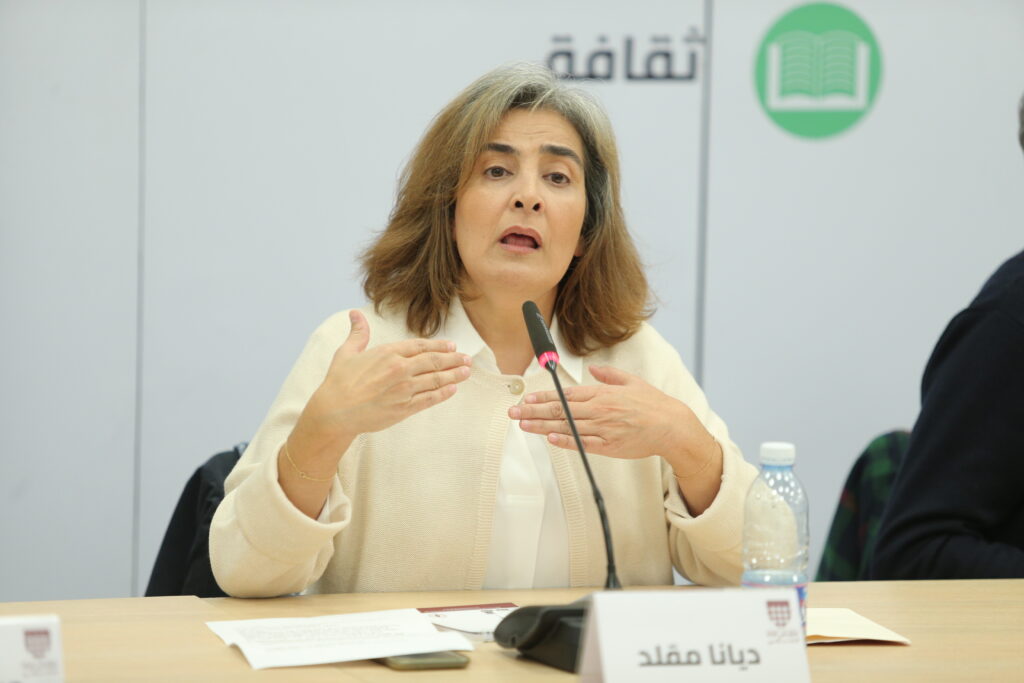
Diana Moukalled
Diana Moukalled opened the meeting by stating that Lebanon, having reached its centenary, is going through an unprecedented multidimensional crisis in its modern history, threatening its existence, identity, and destiny, with its culture not exempt from this drastic collapse. She considered that there is a current war waged against culture and freedoms, plunging Lebanon into a time of decline from a vibrant interactive society to a political junta who has taken control of the country’s security, economic, and sovereign aspects, undermining its institutions. “The danger to culture surpasses the severity of financial, economic, and even security downfall, in a region where despotic and oppressive regimes are rising,” she added.
Moukalled warned that Lebanon might lose its historical position as a window to currents of thoughts, openness, and modernity, which would be a devastating blow to the perception of Lebanon as a historical haven for culture and freedom in the region.
Cinematography as an understanding of culture
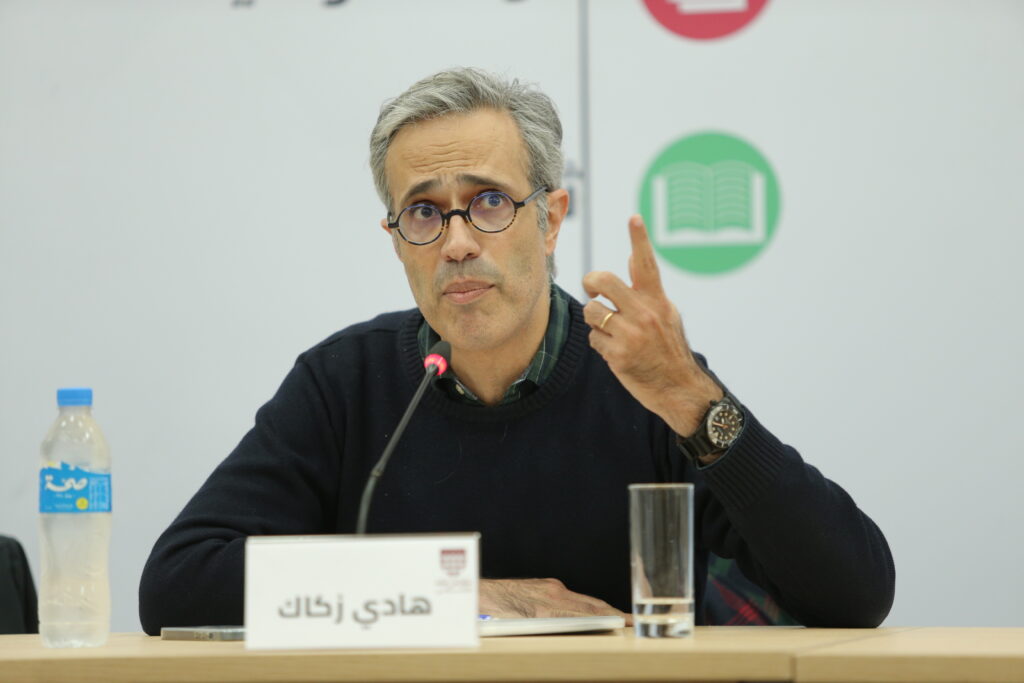
Hadi Zakak
Hadi Zakak noted that cinematography constitutes a memory of the past and a window to the future. “It had over the years the power to depict events in Lebanon chronologically giving a clear picture of the mutation of the society and its traditions,” he stated. Lebanese films were practically the only good witness of change through epochs and customs. “During the ’50s and ’60s, films portrayed the shift from a conservative phase to a more open phase, from portraying Lebanon as a rural place to embracing the city and its diversities. Lebanon became a destination for both Arab and foreign actors,” he quoted. “Arabs seeking love and romance, while foreigners viewing Lebanon as a place for financial transactions he underlined. Post-civil war cinema focused on the many clashes that Lebanon witnessed and their motives. Films also portrayed the conduct of warlords behaviors,” he concluded.
Regarding cinema censorship in Lebanon, Zakak mentioned, “It remains flexible between strictness and openness, taking various forms related to religious, political, individual, and social aspects.”
Mediterraneanism
According to Wissam Saadeh, Lebanon is at a crossroad between collective identity building and border/boundary making. “The essence of the conflict in culture attachment derives from a steep understanding of the Middle Eastern identity,” he said. “Many Lebanese don’t accept transcending their roots to a Phoenician affiliation narrative, while others reject attachment to Arabism,” he said. The professional layer of Lebanese society became multinational in character, balancing its interests and lifestyle along those two vectors.
An attachment has been lost between those who wasted the opportunity to adhere to the values of the West and those who glorified it, while both behaviors have harmed the idea of Mediterraneanism. This tendency has renewed the path for the intersection and crystallization within a narrative often placing people of the region and their cultures above other nations. Saadeh claimed that “the Mediterranean brought to Lebanon a complex combination of ideas, feelings, imageries, cultures, ways of life, nurtured for centuries and still cultured in this “sea (not ocean) amongst lands”; (which was called mare nostrum by Romans) and which could still be denoted in such a way if we understand nostrum in a different way: as a reference to us, human beings.” For Lebanon, Mediterranean values were understood as a departure and arrival point for the construction of a pluralistic society. Seemingly Saadeh was debating a view that Lebanon belongs by heritage to the same wider Mediterranean civilization that embraces Greece, Italy, and France; it needs to advocate the assimilation of modern European culture.
Interestingly Saadeh said that Lebanese had to choose between being affiliated to a culture belonging to the Mediterranean Sea – whose values were the Roman laws and the Philosophy of Greece – or looking to the East. He referred to an analogy to the discovery of two tombs at the Hiram in Byblos and Tutankhamun in Egypt. “Those will be like two epicenters between two trends in society driving the culture realms of the Middle East,” he stated. Referring to Taha Hussein book The Future of Culture in Egypt (1938) which stressed the shared heritage of the Mediterranean civilization and Egypt’s connections with European culture over its relationship with the Middle East, he said Lebanon today falls in such a path, that of bridging Mediterranean culture with Eastern values. Hussein’s book opposed the Arab nationalist view of unity among all Arabic-speaking nations. The question is still debated.
“At the current moment there is a need for a reconciliation with the Mediterranean values – a need embodied in the reconciliation with Lebanon’s maritime and terrestrial maps,” he concluded.
Bazzi
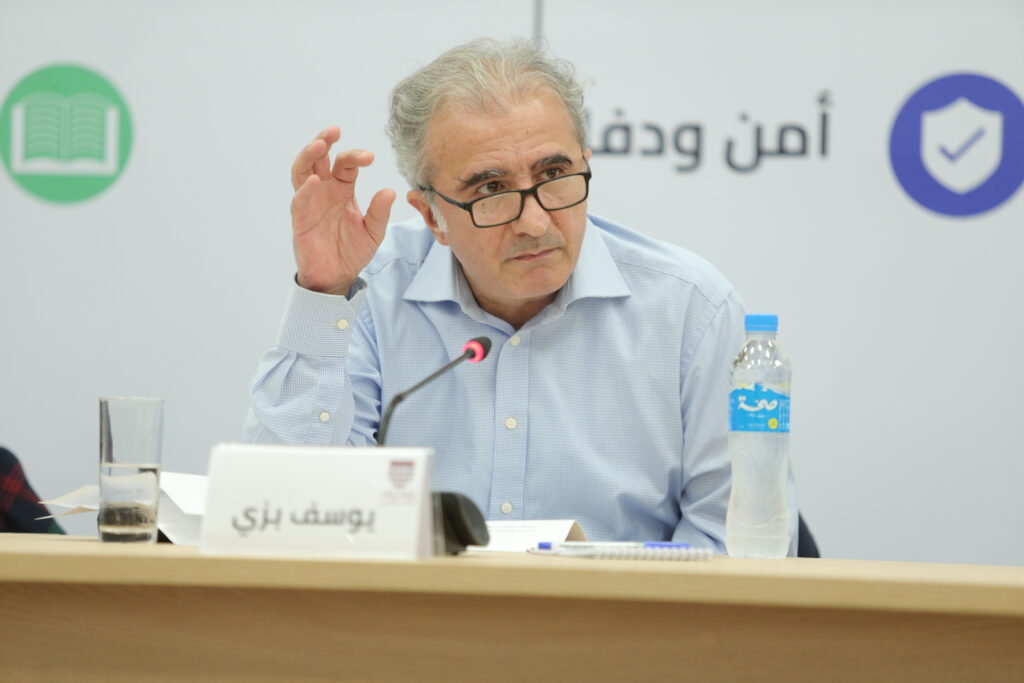
Youssef Bazzi
Youssef Bazzi, in his intervention, provided a historical overview, of the birth of Mount Lebanon’s values, which were advancing at a different pace than the city, seeking legal, political, and cultural independence from the Ottoman world. “Mount Lebanon and Beirut were sources of the Arab Renaissance, hosting the first modern universities, printing presses, translations, newspapers, and modern education,” he said. Based on these foundations, the republic was established on two fundamental principles: democracy and a free economy. He considered that only a handful of desperate democratic values remain in the end of the first century of Lebanon’s birth, while what’s left of the free economy is a black market controlled by the worst kinds of mafias. “Freedom of thought is dying in Lebanon, and attempts to rebuild the state have failed in the near past, a price Lebanese are paying willingly to avoid the renewal of civil war,” he concluded.
Reconciliation and frankness
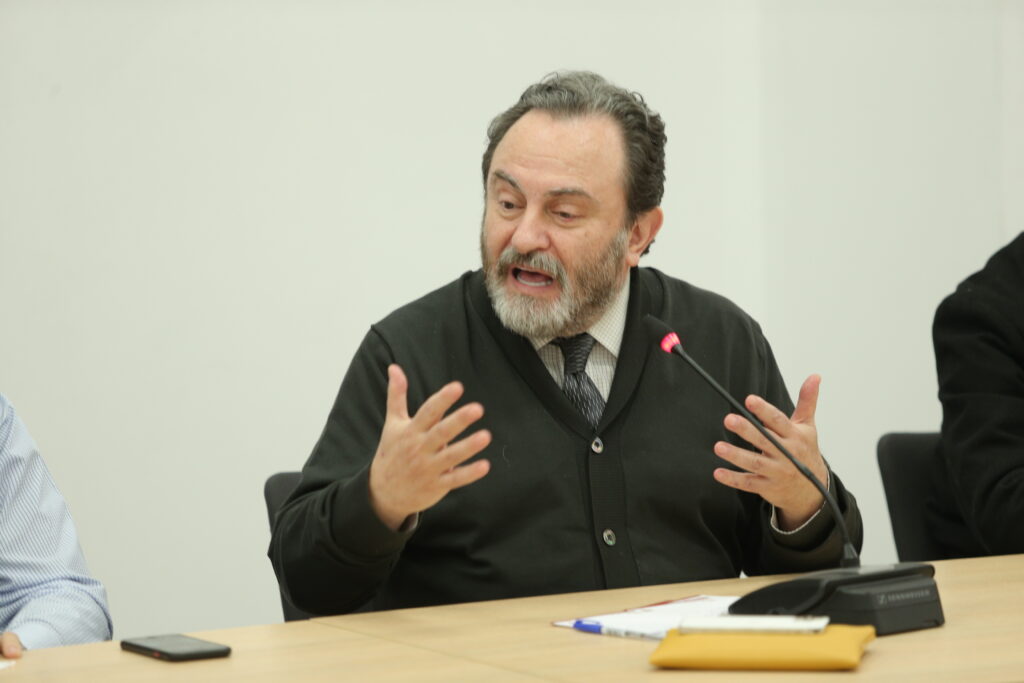
Dr. Hassan Mneimneh
The conference concluded with Dr. Hassan Mneimneh, who highlighted the importance of three fundamental pillars that portray the cultural web in Lebanon: media, education, and documentation. He affirmed that the relationship between the government and society is strained enough, and we cannot rely on the state to enhance an “infrastructure of thought”. “In Lebanon, the society and the state have failed a social contract that allows the state to commit to these institutions.,” he quoted. This crisis is further compounded and amplified by the repeated disillusionment of the citizenry with the functioning of their state institutions. “Therefore, there must be a push from social momentum, an initiative from the Lebanese society, private initiatives, and the private sector, based on the complex, intertwined, and mosaic nature of the Lebanese identity,” he said.
Mneimneh underlined that despite the multiple material problems facing the country, the real underlying issue is the loss of trust between its political leaders and its citizens. There is a crucial necessity to allow for a pluralistic exchange of ideas which will lead to an exchange of free and conflicting discourse, while embarking on a crucial duality which culture lagged behind after the war. “There is a real need for reconciliation and frankness in this discourse,” Mneimneh concluded.
Maan Barazy is an economist and founder and president of the National Council of Entrepreneurship and Innovation. He tweets @maanbarazy.
The views in this story reflect those of the author alone and do not necessarily reflect the beliefs of NOW.



